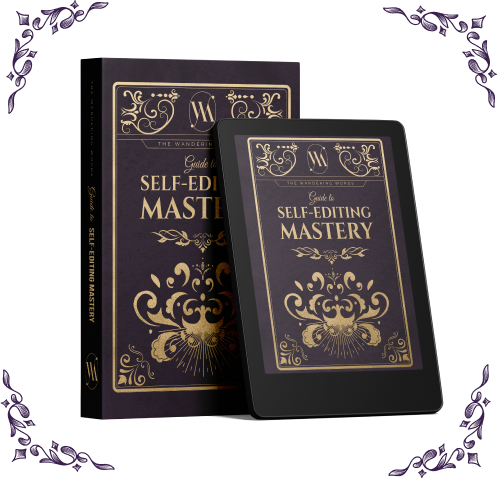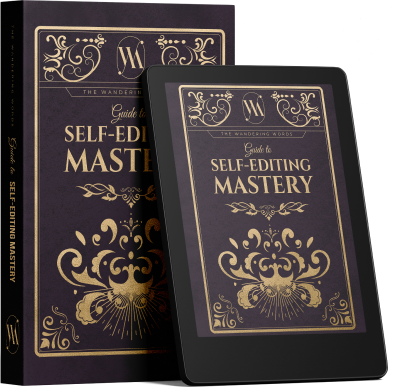Our Guide to Self-Editing Mastery has helped thousands of authors just like you:
- Pre-edit their books with ease
- Avoid the most common writing errors
- Quickly identify spelling & grammar mistakes
- Be more prepared for professional editing
Our Guide to Self-Editing Mastery has helped thousands of authors just like you:


They say rules are made to be broken … but the thought of that can make writers’ eyes twitch. Every writer sometimes grapples with their stylistic choice, deciding when to stick to the rules and when to take creative risks. But surely grammar rules shouldn’t be broken, right?
And surely an editing company wouldn’t be advocating for throwing out the rulebook … right?!
Well, yes—rules are rules, and rules exist for a reason. In writing, rules exist for clarity. We all know that a period goes at the end of a sentence and signifies that a thought has ended—this helps us communicate. If we didn’t have periods it would be hard to know when one thought ended and the next began if we didnt have any punctuation it would be hard to read if we dint haf spelin wee wuld haf a hrd tm reedin atal.
Yeah … some rules are necessary.
But what about less important rules—like, not starting a sentence with “but?” That’s a rule many of us are taught in elementary school, but you see it enough in published books. Could breaking this rule be an acceptable stylistic choice to create a more informal tone?
And what about some other “rules” that you just may not like? Chicago Manual of Style says to write out numbers like two and eight, but that might look weird or get cumbersome when your character is trying to work out two plus two minus four plus six. (2+2)-4+6 is certainly clearer and easier to understand, for most of us.
Generally, when is it okay to break the rules?
Well, ironically, there are rules for that sort of thing.

Poetry is a lawless landscape. Anything goes. Check out e.e. cummings, who breaks one of the most fundamental rules: capitalizing his own name. He even makes the stylistic choice of writing “I” in lowercase in his poems. (But before you lovely poets disappear, listen! Poetry can and should still be edited, even when it’s breaking conventions. You’re not off the hook completely!)
When characters speak, you are free to break the rules—because, well, humans don’t speak correctly. “I ain’t goin’ back there” is okay. So is “You gotta be kidding me.” “Gotta” and “ain’t” aren’t exactly formal, but they’re okay for dialogue!
You can even write out accents … but this is falling out of fashion recently. In part, it’s not popular anymore because it can come off as prejudiced—the people who get their accents written out are often seen as speaking “incorrectly,” while the other characters speak “correctly.” Because those with accents written out are often in a group of people who are “other” than the main character, this can come off as judgemental, and can paint the author in a bad light.
Writing out accents can also be really hard to read. If you’ve ever scratched your head at a Mark Twain book, you know what I mean. The point of writing is clarity. If you must write out accents, my suggestion is to keep it at a few key phrases. Pepper in some y’alls if the character is from the American South, but don’t feel the need to make note of every time the Bostonian misses an R. They aren’t saying “Hahvahd Yahd,” they’re saying “Harvard Yard,” so write the words they’re saying—not how it sounds to a person without that accent.
“‘I’ll see you at Harvard Yard,’ he said in a Boston accent” will get across what you’re trying to convey—without, by the way, making everyone in Massachusetts want to roll their eyes!
However, if you do opt to write out accents, be sure to be consistent. If someone drops the g off of goin’, make sure they don’t suddenly forget and say “going” on the next page. Consistency, consistency, consistency!
(We could write a whole other blog post about writing characters with accents, and maybe one day we will—but before leaving the topic, one more pro tip: do your research. A “British” character can say “cherrio” a hundred times, but the second he calls trousers “pants,” the jig is up.)
The basics of spelling and punctuation usually shouldn’t be messed with. As we’ve already discussed, misspelling words and using basic punctuation incorrectly typically just results in confusion and unclear writing. However, there are some rules you can choose to break, so long as you do so consistently throughout the book.
For example, maybe your character has a sword named Drakontongue. “Drakontongue” isn’t a real word, but you’ve invented it as a name for the sword, so it can exist. As a name, however, you should stick to the basic rule of always capitalizing proper nouns—so yes, you’re doing something stylish, but you’re doing it in a way that is easy to understand. The core rules of English are unbroken.
Or, maybe you choose to use numerals (3) instead of writing out numbers (three). That’s also okay, so long as you do so consistently. If you want to do a 3 here, you shouldn’t suddenly switch to “three” later on.
You can even choose to, for example, keep the spaces on either side of an ellipses … or not…as long as it’s consistent.
The key here is consistency. Almost anything is okay, as a stylistic choice, as long as you do it every time.

To make the best stylistic choices in writing, it’s essential to know the rules. That way, you’ll know when and how to bend or break them. Need to brush up on the rules? Check out these other posts on capitalization, dialogue, and Em Dashes.
If you do make a stylistic choice that “breaks the rules,” be sure to let your editor know! Writing out a personal style guide can be super helpful, both for you and your editor. It can take a lot of the guesswork out of the equation, and can also ensure the editor doesn’t end up “correcting” your purposeful choices.
Also, if you do make a stylistic choice, make sure it’s a choice—not just you being lazy, or having some other kind of ulterior motive. For example, when I was fourteen, I needlessly put a space in the middle of a character’s name (think O’ Reilley with a space before the R instead of just O’Reilley) so I could have a higher word count with less effort. That’s a really bad reason for a “stylistic choice.”
~Christina

